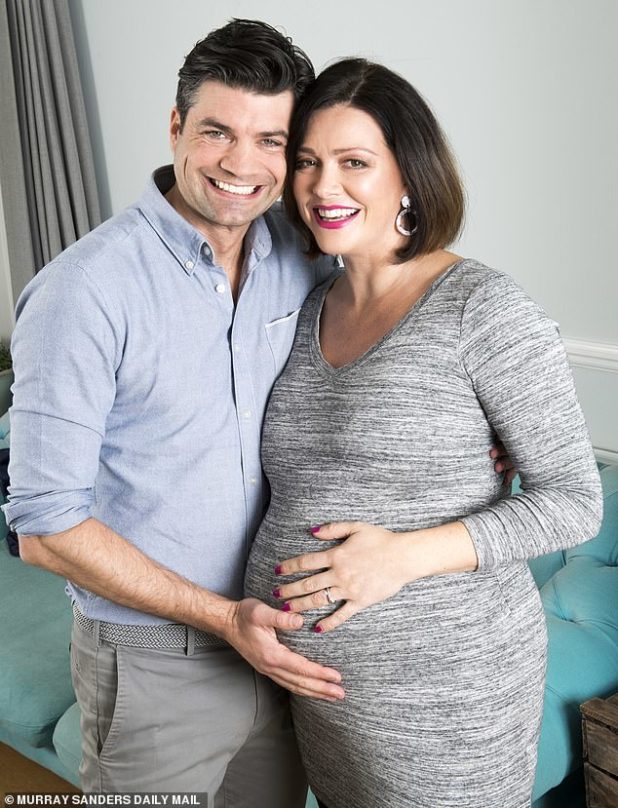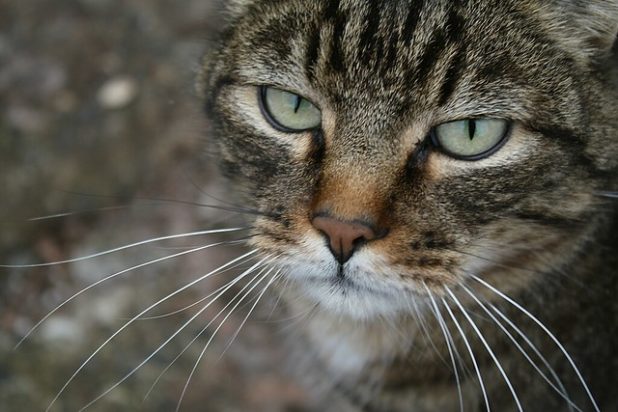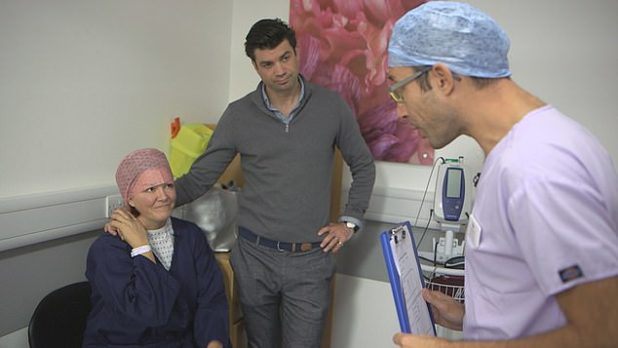Pomidor Quixote
Daily Stormer
November 5, 2019
“Wait for me as I spend the next 15 years rotting away in an office.”
Women’s most valuable asset in life is their youth. With it, they can afford a good man and make lots of babies.
Wasting it in the workforce makes them miserable.
Text messages, from three of news anchor Hannah Vaughan Jones’s dearest friends, and her sister, announcing the happy news of their pregnancies came, one after another, on the very same spring day last year.
Her initial reaction, she’s not ashamed to admit, was one of anger, bitterness and crippling jealousy. Delight for them came later.
Entirely forgivable, you might say, given that Hannah and her husband, Lewis, a fellow broadcaster, were, by then, a considerable way down an interminable and heartbreaking path towards parenthood which still hadn’t yielded any good news.
It was a path that included an astonishing 15 rounds of fertility treatment, at a cost of £80,000, over five-and-a-half agonising years.
‘I was upstairs in my bedroom, getting out of my work clothes, when the final text arrived and I just fell to my knees sobbing,’ recalls Hannah, 38, a presenter with news channel CNN.
‘It was that howling, moaning, cry that you don’t know you’re capable of, that only comes from real grief.
‘Lewis came running up the stairs immediately and found me in this heap on the floor. I didn’t have to say much, just: ‘So-and-so is pregnant, too.’
‘He held me and said: ‘I’m so sorry.’ That made me feel even worse — you don’t want someone to say they’re sorry because it’s wonderful news and every part of you, or 99 per cent of you, is ecstatic for that person, but there’s a big, big ache, and you’re utterly ashamed of it and want to keep it locked away.
‘So, I cried it out for five or ten minutes and then picked myself up and responded to the messages, ready to say the right things.
‘My friends and family knew it was best to text me. They all knew that I didn’t want to be told in person, or over the phone, when they were pregnant.
‘I knew I was going to react badly, in a way they didn’t deserve to see — and I didn’t want them to see — so I needed time to react to the news in private. After a good cry I was ready.’
Can you picture a mother reacting like that to news about her friends moving up in their jobs and getting a raise? Just crying uncontrollably because another woman is succeeding in the workforce.
Try to picture a mother of four thinking “I’d trade my beautiful kids for that job position in a heartbeat.”
This summer, however, it was Hannah’s long-awaited turn to share some good news of her own. Some people received a text. Some were told in person. Some had to wait until she was nearly four months gone before she dared breathe a word at all.
For Hannah is, finally, pregnant, with a baby boy who is due two days before Christmas. Her glorious bump, which she can’t help cradling protectively, a testament to this couple’s resilience and fortitude.
It’s actually a testament to how she wasted her youth.
She looks so old.
That is the only kid she’ll ever have. She won’t get pregnant again. The poor kid will grow up without brothers and without sisters and with an overprotective and obsessive mother.
Hannah and Lewis, also 38, met at journalism college in Cardiff in 2003 and got together as a couple at a reunion in 2009.
Both are high-flyers — Lewis, a BBC World News presenter and former ITN correspondent, studied PPE at Oxford while Hannah, a politics graduate from Nottingham University, has worked for Sky News as well as CNN.
For the first five years they worked hard in their careers while enjoying holidays in the sun and on the slopes, mercifully oblivious to the heartache which was to come. It was around the time of their engagement in 2014 when, both aged 32, they began trying for a baby.
They couldn’t even conceive in their early thirties.
But hey, at least they’re high-flyers! They’re high achievers!
Women should be welcoming their first grandchildren in their early thirties.
By the time they married two years later, in June 2016 — a register office ceremony near their home in West London followed by a lavish reception for 100 guests at a castle in southern France — they had failed to conceive and decided it was time to embark on fertility treatment.
…
Their first, and the only round offered on the NHS, followed in the September. By this time, they’d endured the happiness of plenty of friends who seemed to conceive with apparent ease.
‘Until then, we’d both achieved whatever we had set out to do. We couldn’t believe we’d had to resort to fertility treatment,’ says Hannah.
‘Once we’d got our heads around it, we looked forward to our miracle IVF babies, convinced science would work where we had failed.
Modern women need science and technology to make something grow in their barren wombs.
‘A decent harvest of eggs and a few select swimmers produced just one embryo and, after spending most of that first ‘dreaded two-week wait’ horizontal, I couldn’t believe it when I dutifully peed on a stick and got a negative result.’ NHS chances spent, in early 2016 the couple began treatment at a private clinic in London. In the years since, Hannah has self-administered ‘thousands’ of injections of the hormones necessary to prepare her body for pregnancy, and to stay pregnant, only to be disappointed time and time again.
She’d pour her heart out to the make-up artists who got her screen ready, before putting on her ‘brave face’ on air.
She deceived viewers presenting a false image of a strong, independent, and empowered woman when she was in fact dead inside and a crying mess in private.
She pumped herself full of hormones hoping to achieve what comes effortlessly to young women, and despite turning herself into a walking pharmacy, she was still miserable.
Remember that the next time you see old women in the media acting tough.
‘Before fertility treatment, I’d never felt anything but joy for pregnant women, but seeing strangers with fecund bellies I began to feel resentful. All I could think was: ‘Why you — why not me?‘
‘I never felt hatred towards the mothers-to-be that I love, but I didn’t like the fact that it would creep up on me when I saw pregnant strangers. It was so out of character for me, and I had no idea what they’d been through.
‘There were so many conception attempts, it’s a struggle to remember every round in detail, but the wounds from the lows will be forever etched in my memory.’
She’s telling her story because she’s in a position to do so, working in the media and all. But how many old women like her are suffering in private? Watching happy pregnant strangers and hating, hating, hating them in silence?
As well as the follicle-stimulating drugs and steroids, Hannah was, by then, having immunotherapy treatment, in case her body was rejecting embryos.
Finally, in late 2017, the couple conceived, only to discover at a ten-week scan that the baby’s heartbeat had stopped at eight weeks.
‘Although we’d feared the worst, we were distraught and many, many tears were shed,’ says Hannah. ‘I’ve always had a big fear of failure, largely because I’ve always felt pretty lucky, so feeling like a failed woman was unbearably hard.
‘I questioned everything: what it said about our relationship, were we not a good match? What was wrong with my body? Why couldn’t I do the one thing we are biologically programmed to do?‘
What was wrong was that she was just too old, obviously.
Having plundered their savings, Hannah and Lewis spent every spare penny from their admittedly good incomes as well as relying on the generosity of their mothers (neither of their fathers is alive), and are well aware how fortunate they are to have been able to fund years of expensive treatment.
…
But while Hannah is eager finally to realise her dream of becoming a mum, she is acutely aware that there are childless women out there who will find her joy difficult to bear. There will be plenty of women, reading this story, who’ll have their own sobbing ‘text’ moments. And she feels for every single one of them.
They worked so hard on their careers only to spend all of their savings and their mothers’ money trying to cheat nature.
Wouldn’t it be easier and more efficient to encourage women to become mothers while they’re teenagers? Their fertility and youth are fleeting. They have a very limited window to become mothers.
We need women to become mothers in order to have future generations. Men can’t get pregnant.






